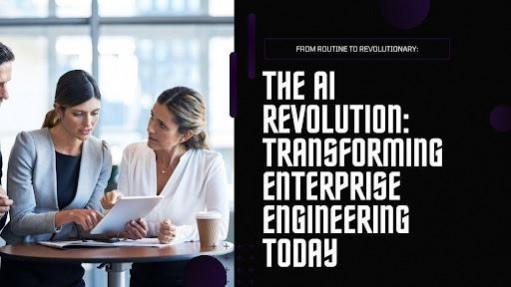
The advent of Artificial Intelligence (AI) has ushered in a new era of productivity and innovation in enterprise engineering. As organizations strive to remain competitive in an increasingly digital landscape, the integration of AI technologies has become not just a luxury but a necessity. Vinay Puri's article explores the profound impact of AI on enterprise productivity, highlighting innovations, challenges, and future directions in this rapidly evolving field.
Automation of Repetitive Tasks
AI's impact on enterprise productivity is profound, particularly in automating repetitive tasks. Robotic Process Automation (RPA) with AI has led to cost reductions of 15% to 90%, averaging 30% across industries. In manufacturing, AI-driven robots enhance productivity and quality by handling assembly tasks.
Beyond manufacturing, AI automation in financial services could save banks up to $447 billion by 2023, primarily through back-office process automation, fraud detection, and improved customer service operations. This demonstrates AI's transformative potential across various sectors, driving significant efficiency and cost savings.
Predictive Analytics for Informed Decision-Making
AI's ability to process and analyze vast amounts of data in real-time has revolutionized enterprise decision-making. Powered by machine learning algorithms, predictive analytics can forecast trends, identify potential issues, and suggest optimal solutions before problems arise. In retail, AI-driven demand forecasting has yielded impressive results.
A major e-commerce platform found that AI-based predictive analytics reduced inventory costs by 30% and increased sales by 15% through precise stock management and targeted promotions. This impact extends to healthcare, where AI-powered predictive models accurately diagnose diseases and predict patient outcomes. A study in Nature Medicine showed that an AI system predicted acute kidney injury up to 48 hours in advance with 90% accuracy.
Personalized Customer Experiences
AI technologies, especially machine learning and natural language processing, have enabled enterprises to deliver highly personalized customer experiences at scale, enhancing customer satisfaction and driving efficiency in marketing and sales. AI-powered chatbots exemplify this impact, handling up to 80% of routine queries, reducing response times by 99%, and cutting service costs by up to 30%.
These chatbots are increasingly sophisticated and capable of understanding and responding to complex queries in multiple languages. In e-commerce, AI-driven personalization significantly boosts sales and customer loyalty. A study by a consultancy group found that retailers using AI personalization saw sales gains of 6-10%, growing two to three times faster than others.
Organizational Adaptation for AI Integration
To fully harness AI's potential, enterprises must adopt agile and flexible organizational structures. Traditional hierarchies are too rigid for the rapid decision-making and innovation cycles AI enables. A study by MIT Sloan Management Review found that companies with flexible, team-based structures are five times more likely to succeed in their AI initiatives than those with traditional hierarchies, highlighting the need for organizational agility in the AI era.
Additionally, AI integration requires rethinking enterprise workflows. For example, an AI-driven workflow optimization system in a large insurance company reduced claim processing time by 40% and improved accuracy by 25%, significantly boosting efficiency.
Challenges and Ethical Considerations
While AI significantly benefits enterprise engineering, several challenges must be addressed. Data privacy and security are paramount as AI systems rely on vast amounts of data. The "black box" nature of many machine learning algorithms raises concerns about unintended data exposure or misuse, necessitating new techniques in "explainable AI" and "privacy-preserving machine learning."
Workforce adaptation and training are also crucial. Integrating AI technologies requires significant workforce adaptation, including developing new skills that complement AI capabilities, such as emotional intelligence, creativity, and complex problem-solving. This holistic approach ensures that AI can be effectively and securely integrated into enterprise systems.
In conclusion, Vinay Puri highlights that integrating AI into enterprise engineering transforms organizational operations and value creation. AI enhances productivity through automation, predictive analytics, and personalized customer experiences but presents challenges in adaptation, data privacy, workforce training, and ethics. Overcoming these ensures enterprises harness AI's full potential for sustainable productivity.
















